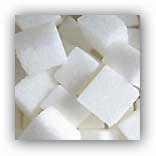|
The American Heart Association links intake of added sugars to weight gain and recommends substantial decreases in consumption to a daily maximum of 100 kcal for women and 150 kcal for
men. Some experts now argue that sugar comprises the single most important cause of the worldwide epidemics of obesity and diabetes, primarily through the effects of fructose at prevailing levels of
consumption.

Fructose, a 6-carbon sugar, is more than twice as sweet as its isomer glucose. Most caloric sweeteners contain approximately equal amounts of these 2 sugars, either linked covalently in sucrose (table sugar) or as monosaccharide mixtures in high-fructose corn syrup and honey.
Pure glucose, as found in unmodified corn syrup, has relatively little sweetness, and pure fructose may cause malabsorption in some people, limiting its practical
use.
Despite chemical similarities, the metabolism of these 2 sugars differs markedly, and this difference underlies recent health
concerns.
Following consumption, glucose potently stimulates insulin secretion, promoting glycogen synthesis in the liver and glucose uptake by tissues throughout the body.
In contrast, fructose does not directly elicit insulin secretion and is taken up almost exclusively by the liver. Moreover, unlike glucose, the metabolism of fructose is not tightly regulated by liver cell energy state. Consequently, fructose rapidly undergoes glycolysis, fueling de novo lipogensis under some conditions.
This newly synthesized lipid may accumulate locally, causing fatty liver and hepatic insulin resistance, or be exported, increasing serum triglycerides, systemic insulin resistance, and fat deposition in adipose
tissue.
Fructose metabolism may also up-regulate hepatic signal transduction pathways involved in inflammation and drive uric acid production, possibly contributing to hypertension and endothelial
dysfunction.
The absence of harm from high fruit consumption likely relates to the slow digestion rate of whole fruit compared for example with a sugar-sweetened beverage, producing portal fructose concentrations that do not exceed hepatic metabolic capacity.
Although soluble fiber helps to reduce sugar absorption rates from the digestive tract (primarily by increasing luminal viscosity), the physical form and cellular structure of whole fruit probably have a greater effect, by sequestering sugar away from the absorptive surface of the small intestine. In addition, the high micronutrient and antioxidant content of fruit may protect against hepatic inflammation and systemic insulin
resistance.
Few modern studies have compared the long-term effects of glucose, fructose, and starch under physiologically relevant condition, and such research should assume high priority. The available evidence suggests 3 key
points.
First, fructose in its primary natural form (whole fruit) is not associated with adverse effects up to the limits of human
consumption.
Second, excessive intake of refined sugar plays a significant role in the epidemics of obesity and related diseases, in part because large amounts of rapidly absorbed fructose can overwhelm hepatic biochemical
pathways.
Third, rapidly absorbed forms of glucose—present in both sugar and high glycemic index starch—also contribute importantly to these diseases, especially considering their much greater caloric contribution to typical diets than
fructose.
Therefore, the recommendation to replace fructose with glucose lacks an evidence basis. Rather, public health efforts should focus on reducing intakes of all highly processed carbohydrates, not just refined
sugar.
For more information
Examining the Health Effects of Fructose
(MDN)
|